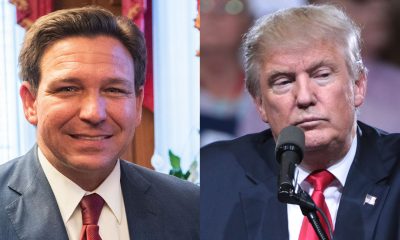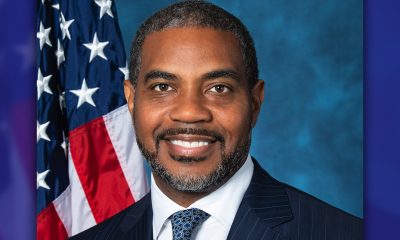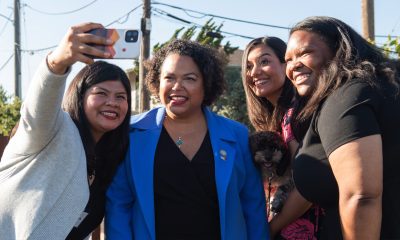National
US Loosens Embargo on Cuba, Making Trade and Travel Easier

In this March 22, 2013 file photo, miniature flags representing Cuba and the U.S. are displayed on the dash of an American classic car in Havana, Cuba. The Obama administration is putting a large dent in the U.S. embargo against Cuba as of Friday, significantly loosening restrictions on American trade and investment. (AP Photo/Franklin Reyes, File)
BRADLEY KLAPPER, Associated Press
MICHAEL WEISSENSTEIN, Associated Press
WASHINGTON (AP) — The Obama administration is putting a large dent in the U.S. embargo against Cuba as of Friday, significantly loosening restrictions on American trade and investment.
The new rules also open up the communist island to greater American travel and allow U.S. citizens to start bringing home small amounts of Cuban cigars after more than a half-century ban.
Thursday’s announcement of new Treasury and Commerce Department regulations are the next step in President Barack Obama’s plan to re-establish diplomatic relations with Cuba. They come three days after U.S. officials confirmed the release of 53 political prisoners Cuba had promised to free.
Only Congress can end the five-decade embargo. But the measures give permission for Americans to use credit cards in Cuba and U.S. companies to export telephone, computer and Internet technologies. Investments in some small business are permitted. General tourist travel is still prohibited, but Americans authorized to visit Cuba need no longer apply for special licenses.
Obama announced last month that he would soften the embargo and begin restoring diplomatic ties with Havana, saying “these 50 years have shown that isolation has not worked.” The deal was the product of 18 months of secret talks that culminated in the exchange of imprisoned spies and release of Alan Gross, a U.S. government contractor who had been imprisoned in Cuba for five years.
The few U.S. companies facilitating travel to Cuba say inquiries have exploded since December. American visits could triple this year, from about 90,000 annually. “We’re hiring more people, we’ve secured more hotel rooms and assets in Cuba to provide additional travel,” said Tom Popper, president of New York-based insightCuba.
With the new regulations public, the focus shifts to American businesses and the Cuban government. Some changes could take months as U.S. firms analyze the risks and benefits of moving into a complicated new market. And the Cuban government has said nothing publicly about how it will regulate new trade with the United States. Foreign companies currently deal almost entirely with state-owned firms that are notoriously slow, inefficient and short on cash.
Cuba will likely be more open to a surge in new travelers than to other potential effects of the loosened rules.
But Cuban hotels generally fall short of international standards and those with better food and service are almost always fully booked during the winter high season.
“This is good news, but we’re lacking infrastructure in hotels and in administration,” said Maikel Gonzalez, a 34-year-old hotel receptionist. “American tourists are really demanding. How do I explain to one that the taxi didn’t come because it doesn’t have tires or that there’s no water in the rooms?”
Individual Cubans can legally rent out their homes or apartments— a potential source of thousands of rooms for travelers and a flood of funding for private citizens that would be largely outside state control.
Also casting a shadow on potential deals is the possibility of litigation by Cuban-Americans and U.S. firms whose property was confiscated in Fidel Castro’s 1959 revolution and may try to sue companies entering into business with the Cuban government. In Washington, Congress may also seek to erect barriers to new investment.
The sudden rapprochement between Cold War foes has divided U.S. lawmakers. Republican Marco Rubio of Florida and Democrat Bob Menendez of New Jersey, both Cuban-Americans, have been particularly opposed.
But some pro-business types have welcomed the opportunity to open up a new export market in a country 90 miles from Florida. Thomas Donohue, the head of the U.S. Chamber of Commerce, for example, said Wednesday it was better for the U.S. to sell computers, smartphones and cars to Cuba than to cede such business to countries like Russia and China. Still, the embargo as a whole appears unlikely to fall anytime soon.
Starting Friday, U.S. companies will be able to export mobile phones, televisions, memory devices, recording devices, computers and software to a country with notoriously poor Internet and telecommunications infrastructure. Internet-based communications will fall under a general license. The new rules “immediately enable the American people to provide more resources to empower the Cuban population to become less dependent upon the state-driven economy,” White House spokesman Josh Earnest said Thursday.
With hundreds of thousands of Cuban-Americans visiting family each year, Cuba is already awash in American products brought in people’s luggage, including iPhones and flat-screen TVs. The main barriers to Internet access are high prices and restrictions imposed by a government desperate for hard currency and worried about allowing citizens unrestricted communications among themselves and with the outside world.
Americans permitted to travel to Cuba for family visits, official U.S. government business, journalism, research, education, religious activity and other reasons now fall under a U.S. general license and don’t need to apply for a separate license. A limit on remittance payments to family members in Cuba will be raised to $8,000 per year, from $2,000. Americans visiting Cuba will be allowed to bring home $100 in alcohol and tobacco products, and $400 in total goods.
The U.S. is now “one step closer to replacing out of date policies,” Treasury Secretary Jacob Lew said Thursday.
Other changes include:
—The elimination of limits on how much money Americans spend in Cuba each day or what they spend it on.
—Permissible use of U.S. credit and debit cards.
—Travel agents and airlines can fly to Cuba without a special license.
—Insurance companies can provide coverage for health, life and travel insurance policies for individuals residing in or visiting Cuba.
—Financial institutions may open accounts at Cuban banks to facilitate authorized transactions.
—Investments can be made in some small businesses and agricultural operations.
—Companies may ship building materials and equipment to private Cuban companies to renovate private buildings.
The U.S. and Cuba are scheduled to hold migration talks in Havana next week, the next step in their normalization process. Leading the American delegation is Roberta Jacobson, the top U.S. diplomat for Latin America. Her visit marks the highest-level trip to Cuba by a U.S. official since 1980.
Further down the road, Washington envisions reopening the U.S. Embassy in Havana and carrying out high-level exchanges and visits between the governments. Secretary of State John Kerry could travel to the island later this year.
___
Weissenstein reported from Havana. AP White House Correspondent Julie Pace contributed to this report.
Copyright 2015 The Associated Press. All rights reserved. This material may not be published, broadcast, rewritten or redistributed.
Activism
Oakland Post: Week of April 17 – 23, 2024
The printed Weekly Edition of the Oakland Post: Week of April 17 – 23, 2024

To enlarge your view of this issue, use the slider, magnifying glass icon or full page icon in the lower right corner of the browser window. ![]()
Barbara Lee
Congresswoman Barbara Lee Issues Statement on Deaths of Humanitarian Aid Volunteers in Gaza
On April 2, a day after an Israeli airstrike erroneously killed seven employees of World Central Kitchen (WCK), a humanitarian organization delivering aid in the Gaza Strip, a statement was release by Rep. Barbara Lee (D-CA-12). “This is a devastating and avoidable tragedy. My prayers go to the families and loved ones of the selfless members of the World Central Kitchen team whose lives were lost,” said Lee.

By California Black Media
On April 2, a day after an Israeli airstrike erroneously killed seven employees of World Central Kitchen (WCK), a humanitarian organization delivering aid in the Gaza Strip, a statement was release by Rep. Barbara Lee (D-CA-12).
“This is a devastating and avoidable tragedy. My prayers go to the families and loved ones of the selfless members of the World Central Kitchen team whose lives were lost,” said Lee.
The same day, it was confirmed by the organization that the humanitarian aid volunteers were killed in a strike carried out by Israel Defense Forces (IDF). Prior to the incident, members of the team had been travelling in two armored vehicles marked with the WCF logo and they had been coordinating their movements with the IDF. The group had successfully delivered 10 tons of humanitarian food in a deconflicted zone when its convoy was struck.
“This is not only an attack against WCK. This is an attack on humanitarian organizations showing up in the direst situations where food is being used as a weapon of war. This is unforgivable,” said Erin Gore, chief executive officer of World Central Kitchen.
The seven victims included a U.S. citizen as well as others from Australia, Poland, the United Kingdom, Canada, and Palestine.
Lee has been a vocal advocate for a ceasefire in Gaza and has supported actions by President Joe Biden to airdrop humanitarian aid in the area.
“Far too many civilians have lost their lives as a result of Benjamin Netanyahu’s reprehensible military offensive. The U.S. must join with our allies and demand an immediate, permanent ceasefire – it’s long overdue,” Lee said.
Commentary
Commentary: Republican Votes Are Threatening American Democracy
In many ways, it was great that the Iowa Caucuses were on the same day as Martin Luther King Jr. Day. We needed to know the blunt truth. The takeaway message after the Iowa Caucuses where Donald Trump finished more than 30 points in front of Florida Gov. De Santis and former South Carolina Governor Nikki Haley boils down to this: Our democracy is threatened, for real.

By Emil Guillermo
In many ways, it was great that the Iowa Caucuses were on the same day as Martin Luther King Jr. Day.
We needed to know the blunt truth.
The takeaway message after the Iowa Caucuses where Donald Trump finished more than 30 points in front of Florida Gov. De Santis and former South Carolina Governor Nikki Haley boils down to this: Our democracy is threatened, for real.
And to save it will require all hands on deck.
It was strange for Iowans to caucus on MLK day. It had a self-cancelling effect. The day that honored America’s civil rights and anti-discrimination hero was negated by evening.
That’s when one of the least diverse states in the nation let the world know that white Americans absolutely love Donald Trump. No ifs, ands or buts.
No man is above the law? To the majority of his supporters, it seems Trump is.
It’s an anti-democracy loyalty that has spread like a political virus.
No matter what he does, Trump’s their guy. Trump received 51% of caucus-goers votes to beat Florida Gov. Ron DeSantis, who garnered 21.2%, and former South Carolina Gov. Nikki Haley, who got 19.1%.
The Asian flash in the pan Vivek Ramaswamy finished way behind and dropped out. Perhaps to get in the VP line. Don’t count on it.
According to CNN’s entrance polls, when caucus-goers were asked if they were a part of the “MAGA movement,” nearly half — 46% — said yes. More revealing: “Do you think Biden legitimately won in 2020?”
Only 29% said “yes.”
That means an overwhelming 66% said “no,” thus showing the deep roots in Iowa of the “Big Lie,” the belief in a falsehood that Trump was a victim of election theft.
Even more revealing and posing a direct threat to our democracy was the question of whether Trump was fit for the presidency, even if convicted of a crime.
Sixty-five percent said “yes.”
Who says that about anyone of color indicted on 91 criminal felony counts?
Would a BIPOC executive found liable for business fraud in civil court be given a pass?
How about a BIPOC person found liable for sexual assault?
Iowans have debased the phrase, “no man is above the law.” It’s a mindset that would vote in an American dictatorship.
Compare Iowa with voters in Asia last weekend. Taiwan rejected threats from authoritarian Beijing and elected pro-democracy Taiwanese vice president Lai Ching-te as its new president.
Meanwhile, in our country, which supposedly knows a thing or two about democracy, the Iowa caucuses show how Americans feel about authoritarianism.
Some Americans actually like it even more than the Constitution allows.
About the Author
Emil Guillermo is a journalist and commentator. He does a mini-talk show on YouTube.com/@emilamok1.
-

 Activism4 weeks ago
Activism4 weeks agoOakland Post: Week of March 27 – April 2, 2024
-

 #NNPA BlackPress4 weeks ago
#NNPA BlackPress4 weeks agoCOMMENTARY: D.C. Crime Bill Fails to Address Root Causes of Violence and Incarceration
-

 #NNPA BlackPress4 weeks ago
#NNPA BlackPress4 weeks agoFrom Raids to Revelations: The Dark Turn in Sean ‘Diddy’ Combs’ Saga
-

 #NNPA BlackPress4 weeks ago
#NNPA BlackPress4 weeks agoCOMMENTARY: Lady Day and The Lights!
-

 #NNPA BlackPress4 weeks ago
#NNPA BlackPress4 weeks agoMayor, City Council President React to May 31 Closing of Birmingham-Southern College
-

 #NNPA BlackPress4 weeks ago
#NNPA BlackPress4 weeks agoBaltimore Key Bridge Catastrophe: A City’s Heartbreak and a Nation’s Alarm
-

 #NNPA BlackPress4 weeks ago
#NNPA BlackPress4 weeks agoBaltimore’s Key Bridge Struck by Ship, Collapses into Water
-

 #NNPA BlackPress4 weeks ago
#NNPA BlackPress4 weeks agoBeloved Actor and Activist Louis Cameron Gossett Jr. Dies at 87





















































